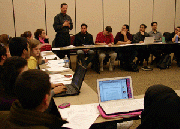The University of Michigan-Dearborn’s student government body voted on Tuesday to form an ad hoc committee to study possible unethical investments within the university’s endowment fund.

|
|
University of Michigan-Dearborn philosophy professor David Skrbina addresses student government members during a meeting on Feb. 3. Skrbina spoke about what he calls unethical investments within the university’s endowment fund that support Israeli military operations. PHOTO: Khalil AlHajal/TAAN |
“We are profiting from the sale of weapons that are used to kill people in Palestine. I think it’s horrendous,” Skrbina said.
A resolution approved by the U of M Board of Regents in 1978 states that if “serious moral or ethical questions” arise over investments, “an advisory committee… will be appointed to gather information and formulate recommendations.”
“We did this for South Africa,” Skrbina said.
He said that within a year of the formation of official exploratory committees on divestment from apartheid South Africa in 1978 and from tobacco companies in 2000, the university sold the stocks in question.
“It worked. It set a good example and it was morally correct,” he said.
Skrbina’s address sparked extensive, heated discussion and at the following meeting on Tuesday, student Senator Mohammed Cherri proposed the vote to create a preliminary committee to discuss divestment from entities contributing to human rights abuses around the world. The committee, to be appointed by student government President Ali Beydoun, is to report back to the body and recommend further action.
Skrbina, when asked by some senators why he focused on the Israeli-Palestinian conflict, said the university is profiting in particular from the war industry there, and that “the human rights abuses are particularly egregious.”
Student government resolutions in favor of divestment from Israel have passed at the Dearborn campus three times before, in 2005, ’06 and ’07, according to former student senators. The first passage garnered national media attention.
Similar resolutions have passed at the Flint campus and failed at the main Ann Arbor campus.
Skrbina said yearly resolutions and added pressure on top university officials through more student activity and faculty involvement could have an impact over time.
“If we can establish a continuous record of moral opposition… that would put some pressure on,” he said. “It sends a message that you’re not going to allow unethical investments to go unchallenged… The hard part is raising awareness over time.”
Skrbina said that he and a group of professors have in the past approached the Board of Regents to propose forming an official exploratory committee on the investments, but that the appeal fell on deaf ears.
“There are a couple of regents who are Jewish Americans who believe it is anti-Semitic, which, of course, it’s not,” he said.
He said he would consider starting a second effort to meet with the regents if the students were to pass another resolution demanding the regents form an official exploratory committee.
Opposition from the regents and U of M President Mary Sue Coleman, Skrbina said, seems based on concern over how divestment would look to Jewish communities.
“Apparently there’s no concern over how it looks to the Arab American community,” he said.
Along with a list of 110 faculty members who have signed-on to support an inquiry into divestment, Skrbina presented to student government a March 2007 letter from the Congress of Arab American Organizations to university officials expressing “deep concern regarding the investments by U of M in the on-going Israeli military occupation of Palestine.”
“I just want to know where my money is going,” said Senator Zainab Sabbagh, 19.
“If it was a Palestinian bomb killing an Israeli kid, I wouldn’t want my money going to that either… A dollar going toward killing an innocent life is a dollar too much,” said Sabbagh, a freshman philosophy student from Dearborn Heights.
“Killing and defending yourself is open to interpretation,” said Senator Dawn Dodge.
Dodge said she’s arranged for a speaker at the next student government meeting on Feb. 17 to address the group with a presentation in support of Israel.
“They’re going to be speaking about the other side of the divestment issue,” she said.
Student government President Ali Beydoun, like several other members of the group, said that while he would personally agree with divestment, he doesn’t agree that, as representatives of all UM-D students, the group should take a position on the issue.
“I just don’t think it’s a student government issue,” he said. “We’re not here to alienate people… I don’t think it’s fair for student government to take sides on this.”
U of M-Dearborn alumnus Jamil Khuja, who helped draft the original student government divestment resolution in 2005, said he will never be able to donate to his alma mater as long as the investments in question stand.
“I won’t give money to a school that’s going to give money to Boeing to give F-16s to Israel to kill 1,300 Palestinians in Gaza in three weeks.”
He said there are other investment opportunities the university could look into that would allow students to sleep better at night.
The homes of some 30,000 Palestinians were destroyed and more than 1,300 people were killed last month during Israel’s 23-day offensive on Gaza.






Leave a Reply